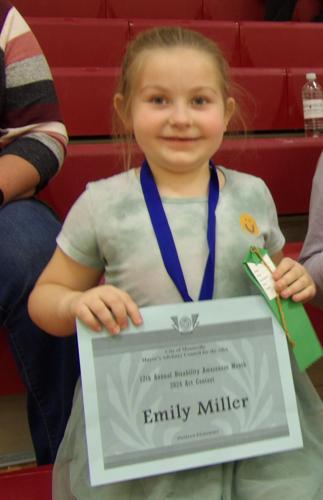WOLCOTT — The Wolcott Farmers Market will be at the Wolcott Town Park this spring and summer.
After the graduation of Hannah Hodgen and Emma Need, two all-stars from a season ago, Twin Lakes’ varsity girls tennis team was looking to re-up in the 2024 season.
April 20
Lafayette District — As April, designated as National Hands-Free Driving Month by the National Highway Traffic Safety Administration (NHTSA), comes to a close, the Indiana State Police (ISP) is urging drivers to adhere to the Hands-Free Driving Law, enacted to enhance safety on Indiana roadw…
Smiles of the Day
Monticello, IN
Right Now
- Humidity: 68%
- Feels Like: 73°
- Heat Index: 73°
- Wind: 3 mph
- Wind Chill: 73°
- UV Index: 5 Moderate
- Sunrise: 06:42:10 AM
- Sunset: 08:45:50 PM
- Dew Point: 62°
- Visibility: 10 mi
Today
Cloudy skies. Slight chance of a rain shower. High 76F. Winds NNW at 10 to 15 mph.
Tonight
A few clouds. Low 54F. Winds NNE at 10 to 15 mph.
Tomorrow
Partly cloudy skies. Very warm. High 81F. Winds light and variable.
Chance of Rain: 15%
Sunrise: 06:42:10 AM
Sunset: 08:45:50 PM
Humidity: 64%
Wind: NNW @ 12 mph
UV Index: 5 Moderate
Friday Night
A few clouds. Low 54F. Winds NNE at 10 to 15 mph.
Chance of Rain: 9%
Sunrise: 06:40:57 AM
Sunset: 08:46:52 PM
Humidity: 70%
Wind: SE @ 5 mph
UV Index: 8 Very High
Saturday Night
Overcast with rain showers at times. Very warm. Low 56F. Winds SSW at 5 to 10 mph. Chance of rain 50%.
Chance of Rain: 24%
Sunrise: 06:39:44 AM
Sunset: 08:47:55 PM
Humidity: 68%
Wind: NNW @ 10 mph
UV Index: 7 High
Sunday Night
Partly cloudy skies during the evening will give way to cloudy skies overnight. Low 52F. Winds N at 5 to 10 mph.
Chance of Rain: 45%
Sunrise: 06:38:34 AM
Sunset: 08:48:57 PM
Humidity: 68%
Wind: ENE @ 8 mph
UV Index: 7 High
Monday Night
Partly cloudy skies early followed by increasing clouds with showers developing later at night. Warm. Low 59F. Winds ESE at 5 to 10 mph. Chance of rain 60%.
Chance of Rain: 58%
Sunrise: 06:37:24 AM
Sunset: 08:49:59 PM
Humidity: 75%
Wind: SSW @ 14 mph
UV Index: 6 High
Tuesday Night
Scattered showers and thunderstorms. Very warm. Low 61F. Winds SW at 10 to 15 mph. Chance of rain 60%.
Chance of Rain: 58%
Sunrise: 06:36:16 AM
Sunset: 08:51 PM
Humidity: 66%
Wind: SSW @ 13 mph
UV Index: 8 Very High
Wednesday Night
Scattered showers and thunderstorms. Low 59F. Winds SW at 10 to 15 mph. Chance of rain 60%. Locally heavy rainfall possible.
Chance of Rain: 52%
Sunrise: 06:35:10 AM
Sunset: 08:52:01 PM
Humidity: 69%
Wind: W @ 13 mph
UV Index: 8 Very High
Thursday Night
Partly cloudy. Low 54F. Winds WNW at 10 to 15 mph.
Recent Obituaries
Special Sections Spotlight
REMINGTON — Tri-County remained a half-game behind Midwest Conference leader North Newton with its 11-1 rout of visiting South Newton Tuesday, April 30, at Remington Community Park.
With just a handful of matches under their belt, Twin Lakes’ varsity golf team is showing the signs of a team that not only has its sights on a sectional repeat but more so, can achieve it.
Twin Lakes High School’s Jamison Ousley signed his National Letter of Intent on April 11 to continue his athletic career next season at the University of Evansville where he will golf collegiately.
While Frontier’s varsity baseball team will have a new head coach at the helm in Ron Benakovich, they too will have new faces on the diamond as they tout a roster made up of 13 underclassmen.
As they continue to get deeper into the regular season, Twin Lakes’ varsity softball team is finding new ways to push the envelope of growth while still looking to accumulate wins along the way.
Business
What’s better than a 100 GRAND candy bar? Alliance Bank donating over $100,000 to local non-profits in 2023. Alliance Bank is celebrating the milestone this month by handing out fun size 100 G…
In this article, Dr. Puja Uppal, Family Medicine, shares her expert insights of the findings and provides Indiana residents with evidence-based recommendations for protecting their health.Why This Matters to YouThe USPSTF has strongly recommended that all women begin breast cancer screenings at age 40. Screenings should continue every other year through age 74.What This Means for Your Health"This proactive shift in public health strategy is aimed at reducing breast cancer death rates among women." Dr. Puja Uppal, Family MedicineDoctor's Expert Insights About The New Mammogram USPSTF Guidelines and Women's Health in Monroe County, IndianaKnow this: "The new guidelines now say that all women should get a mammogram every two years, starting at age 40. This change was made mainly because more women in their 40s are getting breast cancer than before. Also, Black women have a higher chance of dying from breast cancer, when compared to other women. Starting screenings at a younger age could help find breast cancer earlier and improve the chances of survival.Doctors should talk to their patients about these new guidelines. They should make sure their patients understand why it's important to get screened on time. Also, if you have dense breasts, we now have more available options to improve screeningMany people may not know that having dense breasts can make it harder to see breast cancer on a mammogram." Dr. Puja Uppal, Family Medicine.Actionable Steps: What You Can Do NextFurther steps: Talk to your doctor to find out if you're at high risk for breast cancer. And, if so, you may be eligible for a 3-D mammogram. Early detection is key! Health News Today: The USPSTF advises that all women start getting breast cancer screenings every other year--starting at age 40.The new guidelines suggest that getting a mammogram every two years has more benefits and fewer downsides compared to getting one every year.The Science Made Simple: Key Findings and What They Mean for Monroe County ResidentsBreast cancer mortality: Biennial screening mammography in women aged 40 to 74 years has a moderate benefit in reducing breast cancer mortality.Disparities in breast cancer outcomes: Black women are more likely to be diagnosed with breast cancer beyond stage I. Also, Black women are more likely to be diagnosed with triple-negative cancers and are approximately 40% more likely to die of breast cancer compared with White women.Digital breast tomosynthesis (DBT): Current evidence suggests that both digital mammography and DBT are effective primary screening modalities. Modeling estimates that the benefits of DBT are similar to digital mammography.Supplemental screening: There is insufficient evidence to determine the balance of benefits and harms of supplemental screening for breast cancer using breast ultrasonography or MRI in women identified to have dense breasts on an otherwise negative screening mammogram.Screening in older women: There is insufficient evidence to determine the balance of benefits and harms of screening mammography in women 75 years or older.Conclusion: The USPSTF recommends biennial screening mammography for women aged 40 to 74 years. More research is needed to address evidence gaps regarding screening in older women, supplemental screening in women with dense breasts, and disparities in breast cancer outcomes, especially in Black women.Medical News Today: What This Means for Your Health in Monroe County, IndianaThe Bottom Line: Early detection is key, and every woman should discuss their screening schedule with their healthcare provider to ensure timely and appropriate care."This change was driven by two major factors. First, more women in their 40s are getting breast cancer, with rates increasing about 2% each year—which means there is more potential benefit to screening. Second, our modeling was able to use new data on screening in the United States and to look at outcomes specific to Black women for the first time. It is now clear that screening every other year starting at age 40 years has the potential to save about 20% more lives from breast cancer among all women, and there is even greater potential benefit for Black women, who are about 40% more likely to die of breast cancer." USPSTF. (Study Interview)What They're Saying: "These recommendations apply to cisgender women and all other persons assigned female at birth (including transgender men and nonbinary persons) 40 years or older at average risk of breast cancer. This is because the net benefit estimates are driven by sex (ie, female) rather than gender identity, although the studies reviewed for this recommendation generally used the term “women.” These recommendations apply to persons who have factors associated with an increased risk of breast cancer, such as a family history of breast cancer (ie, a first-degree relative with breast cancer) or having dense breasts. They do not apply to persons who have a genetic marker or syndrome associated with a high risk of breast cancer (eg, BRCA1 or BRCA2 genetic variation), a history of high-dose radiation therapy to the chest at a young age, or previous breast cancer or a high-risk breast lesion on previous biopsies. Of note, the USPSTF has a separate recommendation on risk assessment, genetic counseling, and genetic testing for BRCA-related cancer,8 and family history is a common feature of risk assessment tools that help determine likelihood of BRCA1 or BRCA2 genetic variation." (Study Source)Read More Rising Breast Cancer Rates in Young Women Under 50. Doctor ExplainsHealth Standard Newswire: The USPSTF advises that all women start getting breast cancer screenings every other year-- starting at age 40.Health Facts That Matter: Key Statistics for Monroe County, IndianaThe following health facts impact your physical health directly!Did you know there were 13983 deaths from cancer in Indiana in 2021?18.7% of you in Monroe County are smokers.65.9% of you in Monroe County have had a mammogram in the past year.33% of you in Monroe County are binge drinkers.All of these variables above play an important role in the outcomes of your overall health.The Health Standard Newswire.
In this article, Dr. Puja Uppal, Family Medicine, shares her expert insights of the findings and provides Indiana residents with evidence-based recommendations for protecting their health.Why This Matters to YouThe USPSTF has strongly recommended that all women begin breast cancer screenings at age 40. Screenings should continue every other year through age 74.What This Means for Your Health"This proactive shift in public health strategy is aimed at reducing breast cancer death rates among women." Dr. Puja Uppal, Family MedicineDoctor's Expert Insights About The New Mammogram USPSTF Guidelines and Women's Health in Vanderburgh County, IndianaKnow this: "The new guidelines now say that all women should get a mammogram every two years, starting at age 40. This change was made mainly because more women in their 40s are getting breast cancer than before. Also, Black women have a higher chance of dying from breast cancer, when compared to other women. Starting screenings at a younger age could help find breast cancer earlier and improve the chances of survival.Doctors should talk to their patients about these new guidelines. They should make sure their patients understand why it's important to get screened on time. Also, if you have dense breasts, we now have more available options to improve screeningMany people may not know that having dense breasts can make it harder to see breast cancer on a mammogram." Dr. Puja Uppal, Family Medicine.Actionable Steps: What You Can Do NextFurther steps: Talk to your doctor to find out if you're at high risk for breast cancer. And, if so, you may be eligible for a 3-D mammogram. Early detection is key! Health News Today: The USPSTF advises that all women start getting breast cancer screenings every other year--starting at age 40.The new guidelines suggest that getting a mammogram every two years has more benefits and fewer downsides compared to getting one every year.The Science Made Simple: Key Findings and What They Mean for Vanderburgh County ResidentsBreast cancer mortality: Biennial screening mammography in women aged 40 to 74 years has a moderate benefit in reducing breast cancer mortality.Disparities in breast cancer outcomes: Black women are more likely to be diagnosed with breast cancer beyond stage I. Also, Black women are more likely to be diagnosed with triple-negative cancers and are approximately 40% more likely to die of breast cancer compared with White women.Digital breast tomosynthesis (DBT): Current evidence suggests that both digital mammography and DBT are effective primary screening modalities. Modeling estimates that the benefits of DBT are similar to digital mammography.Supplemental screening: There is insufficient evidence to determine the balance of benefits and harms of supplemental screening for breast cancer using breast ultrasonography or MRI in women identified to have dense breasts on an otherwise negative screening mammogram.Screening in older women: There is insufficient evidence to determine the balance of benefits and harms of screening mammography in women 75 years or older.Conclusion: The USPSTF recommends biennial screening mammography for women aged 40 to 74 years. More research is needed to address evidence gaps regarding screening in older women, supplemental screening in women with dense breasts, and disparities in breast cancer outcomes, especially in Black women.Medical News Today: What This Means for Your Health in Vanderburgh County, IndianaThe Bottom Line: Early detection is key, and every woman should discuss their screening schedule with their healthcare provider to ensure timely and appropriate care."This change was driven by two major factors. First, more women in their 40s are getting breast cancer, with rates increasing about 2% each year—which means there is more potential benefit to screening. Second, our modeling was able to use new data on screening in the United States and to look at outcomes specific to Black women for the first time. It is now clear that screening every other year starting at age 40 years has the potential to save about 20% more lives from breast cancer among all women, and there is even greater potential benefit for Black women, who are about 40% more likely to die of breast cancer." USPSTF. (Study Interview)What They're Saying: "These recommendations apply to cisgender women and all other persons assigned female at birth (including transgender men and nonbinary persons) 40 years or older at average risk of breast cancer. This is because the net benefit estimates are driven by sex (ie, female) rather than gender identity, although the studies reviewed for this recommendation generally used the term “women.” These recommendations apply to persons who have factors associated with an increased risk of breast cancer, such as a family history of breast cancer (ie, a first-degree relative with breast cancer) or having dense breasts. They do not apply to persons who have a genetic marker or syndrome associated with a high risk of breast cancer (eg, BRCA1 or BRCA2 genetic variation), a history of high-dose radiation therapy to the chest at a young age, or previous breast cancer or a high-risk breast lesion on previous biopsies. Of note, the USPSTF has a separate recommendation on risk assessment, genetic counseling, and genetic testing for BRCA-related cancer,8 and family history is a common feature of risk assessment tools that help determine likelihood of BRCA1 or BRCA2 genetic variation." (Study Source)Read More Rising Breast Cancer Rates in Young Women Under 50. Doctor ExplainsHealth Standard Newswire: The USPSTF advises that all women start getting breast cancer screenings every other year-- starting at age 40.Health Facts That Matter: Key Statistics for Vanderburgh County, IndianaThe following health facts impact your physical health directly!Did you know there were 13983 deaths from cancer in Indiana in 2021?21.2% of you in Vanderburgh County are smokers.69.3% of you in Vanderburgh County have had a mammogram in the past year.36.6% of you in Vanderburgh County are binge drinkers.All of these variables above play an important role in the outcomes of your overall health.The Health Standard Newswire.
In this article, Dr. Puja Uppal, Family Medicine, shares her expert insights of the findings and provides Indiana residents with evidence-based recommendations for protecting their health.Why This Matters to YouThe USPSTF has strongly recommended that all women begin breast cancer screenings at age 40. Screenings should continue every other year through age 74.What This Means for Your Health"This proactive shift in public health strategy is aimed at reducing breast cancer death rates among women." Dr. Puja Uppal, Family MedicineDoctor's Expert Insights About The New Mammogram USPSTF Guidelines and Women's Health in Howard County, IndianaKnow this: "The new guidelines now say that all women should get a mammogram every two years, starting at age 40. This change was made mainly because more women in their 40s are getting breast cancer than before. Also, Black women have a higher chance of dying from breast cancer, when compared to other women. Starting screenings at a younger age could help find breast cancer earlier and improve the chances of survival.Doctors should talk to their patients about these new guidelines. They should make sure their patients understand why it's important to get screened on time. Also, if you have dense breasts, we now have more available options to improve screeningMany people may not know that having dense breasts can make it harder to see breast cancer on a mammogram." Dr. Puja Uppal, Family Medicine.Actionable Steps: What You Can Do NextFurther steps: Talk to your doctor to find out if you're at high risk for breast cancer. And, if so, you may be eligible for a 3-D mammogram. Early detection is key! Health News Today: The USPSTF advises that all women start getting breast cancer screenings every other year--starting at age 40.The new guidelines suggest that getting a mammogram every two years has more benefits and fewer downsides compared to getting one every year.The Science Made Simple: Key Findings and What They Mean for Howard County ResidentsBreast cancer mortality: Biennial screening mammography in women aged 40 to 74 years has a moderate benefit in reducing breast cancer mortality.Disparities in breast cancer outcomes: Black women are more likely to be diagnosed with breast cancer beyond stage I. Also, Black women are more likely to be diagnosed with triple-negative cancers and are approximately 40% more likely to die of breast cancer compared with White women.Digital breast tomosynthesis (DBT): Current evidence suggests that both digital mammography and DBT are effective primary screening modalities. Modeling estimates that the benefits of DBT are similar to digital mammography.Supplemental screening: There is insufficient evidence to determine the balance of benefits and harms of supplemental screening for breast cancer using breast ultrasonography or MRI in women identified to have dense breasts on an otherwise negative screening mammogram.Screening in older women: There is insufficient evidence to determine the balance of benefits and harms of screening mammography in women 75 years or older.Conclusion: The USPSTF recommends biennial screening mammography for women aged 40 to 74 years. More research is needed to address evidence gaps regarding screening in older women, supplemental screening in women with dense breasts, and disparities in breast cancer outcomes, especially in Black women.Medical News Today: What This Means for Your Health in Howard County, IndianaThe Bottom Line: Early detection is key, and every woman should discuss their screening schedule with their healthcare provider to ensure timely and appropriate care."This change was driven by two major factors. First, more women in their 40s are getting breast cancer, with rates increasing about 2% each year—which means there is more potential benefit to screening. Second, our modeling was able to use new data on screening in the United States and to look at outcomes specific to Black women for the first time. It is now clear that screening every other year starting at age 40 years has the potential to save about 20% more lives from breast cancer among all women, and there is even greater potential benefit for Black women, who are about 40% more likely to die of breast cancer." USPSTF. (Study Interview)What They're Saying: "These recommendations apply to cisgender women and all other persons assigned female at birth (including transgender men and nonbinary persons) 40 years or older at average risk of breast cancer. This is because the net benefit estimates are driven by sex (ie, female) rather than gender identity, although the studies reviewed for this recommendation generally used the term “women.” These recommendations apply to persons who have factors associated with an increased risk of breast cancer, such as a family history of breast cancer (ie, a first-degree relative with breast cancer) or having dense breasts. They do not apply to persons who have a genetic marker or syndrome associated with a high risk of breast cancer (eg, BRCA1 or BRCA2 genetic variation), a history of high-dose radiation therapy to the chest at a young age, or previous breast cancer or a high-risk breast lesion on previous biopsies. Of note, the USPSTF has a separate recommendation on risk assessment, genetic counseling, and genetic testing for BRCA-related cancer,8 and family history is a common feature of risk assessment tools that help determine likelihood of BRCA1 or BRCA2 genetic variation." (Study Source)Read More Rising Breast Cancer Rates in Young Women Under 50. Doctor ExplainsHealth Standard Newswire: The USPSTF advises that all women start getting breast cancer screenings every other year-- starting at age 40.Health Facts That Matter: Key Statistics for Howard County, IndianaThe following health facts impact your physical health directly!Did you know there were 13983 deaths from cancer in Indiana in 2021?21.8% of you in Howard County are smokers.69.4% of you in Howard County have had a mammogram in the past year.41.2% of you in Howard County are binge drinkers.All of these variables above play an important role in the outcomes of your overall health.The Health Standard Newswire.
History's Mysteries
The three-year span from 1903 to 1906 identifies the groundwork period, building and completion of Monticello’s Carnegie Library.
If you have followed this column over the last year, you will remember the article on Burnettsville’s newspapers. Today we will share “the rest of the story.”
The March 29, 1918, edition of the White County Democrat featured an article about State Fire Marshal McCall’s condemnation and removal of nine Monticello structures.




























































